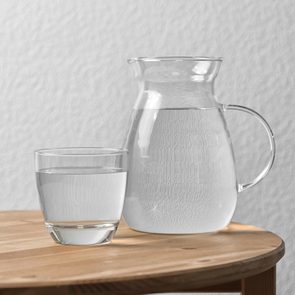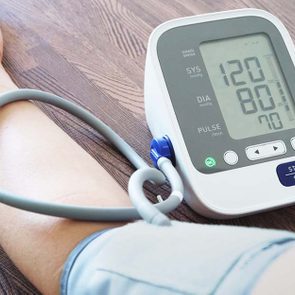We all know that proper hydration is important for our health. But if you're dehydrated, how does that affect your blood pressure?

Does Dehydration Cause High Blood Pressure? Expert Doctors Explain

Many of us have experienced the tell-tale signs of not drinking enough water: You feel dizzy, are generally tired, have muscle cramps, or get a headache. But does dehydration cause high blood pressure, too?
Our body’s systems rely on a healthy balance of fluids to function. If that balance is out of whack, it can have profound impacts on our circulatory system and heart health, explains Pamela Tambini, MD, a double board-certified physician at West Palm Beach VA Medical Center and the Medical Director for Engage Wellness.
“Staying hydrated isn’t just about quenching your thirst—it’s vital to maintaining your cardiovascular health,” Dr. Tambini says. “Dehydration can raise blood pressure, strain your heart unnecessarily, and disrupt your body’s delicate electrolyte balance.”
What is dehydration?

If you are dehydrated, your body doesn’t have enough fluids to do what it needs to do. What’s more, dehydration can result in low amounts of fluid circulating in your blood vessels.
“This low circulating blood volume causes the release of the hormone vasopressin, and when in high enough concentrations, vasopressin constricts blood vessels and causes higher blood pressure,” says Mark Conroy, MD, a double board-certified emergency medicine and sports medicine physician at The Ohio State University Wexner Medical Center.
Symptoms of dehydration
Dehydration can cause many symptoms, including headache, lethargy, and constipation. It may even make your heart skip a beat.
Other symptoms of dehydration to be on the lookout for, according to Dr. Conroy, include:
- Dark, highly concentrated urine
- Not urinating frequently
- Not sweating during activity
- Dry tongue
- Dry, cracked lips
- Dizziness
- Weakness
Even mild dehydration can cause symptoms, he notes. Don’t wait until you are thirsty to realize you are dehydrated. “If you are thirsty, it’s usually too late,” says Dr. Conroy, who often treats people for dehydration in the emergency room.
Causes of dehydration
- Illness
- Vomiting
- Severe diarrhea
- Overuse of water pills or diuretics
- Strenuous exercise
What is high blood pressure?

High blood pressure is when the force of blood against your artery walls is too high when your heart beats. If left untreated, this force can damage the blood vessels and cause heart disease, stroke, kidney failure, and/or vision problems over time.
Systolic blood pressure, the upper number in a blood pressure measurement, is how much pressure your blood is exerting against your artery walls when your heart is beating. Diastolic blood pressure, the lower number, is the pressure when your heart is resting between beats. A blood pressure of less than 120/80 mm Hg is considered normal.
There are many causes of high blood pressure, including genetics, eating an unhealthy diet loaded with salt, being overweight, and not getting enough exercise.
Symptoms of high blood pressure
The American Heart Association (AHA) coins high blood pressure as the “silent killer” because there are no obvious symptoms for most people. In fact, the AHA says nearly half of U.S. adults have high blood pressure, and many aren’t even aware they have it. The only way to know if you have high blood pressure is to have it checked with a blood pressure cuff.
Warning signs tend to only kick in when a person’s blood pressure reaches dangerously high—and potentially life-threatening—levels, according to data from the World Health Organization (WHO). These symptoms can include:
- Severe headaches
- Dizziness
- Chest pain and difficulty breathing
- Heart palpitations
- Nausea and vomiting
- Blurred vision
- Anxiety and confusion
- Frequent nosebleeds
- Buzzing in the ears
Does dehydration cause high blood pressure?

“Yes, dehydration can contribute to high blood pressure,” Dr. Tambini says. “When your body doesn’t have enough water, it responds by conserving fluids, and one way it does this is by releasing a hormone called vasopressin.” As Dr. Conroy explained above, this hormone signals your blood vessels to constrict. “[This] raises blood pressure to ensure that vital organs like your brain and heart continue to receive enough blood,” Dr. Tambini explains.
“At the same time, dehydration reduces the total volume of blood circulating through your system, forcing your heart to work harder to maintain adequate circulation,” she says. “Over time, repeated episodes of dehydration can place chronic stress on your cardiovascular system, increasing the risk of developing persistent high blood pressure.”
Still, Dr. Conroy adds that there is no precise data on how dehydrated you need to be to see an increase in your blood pressure.
Dehydration can also cause low blood pressure
Dehydration can also sometimes cause low blood pressure, which can lead to fainting.
“You expect that if someone gets dehydrated, their blood pressure will go down,” says Evan Appelbaum, MD, FACC, a board-certified cardiologist at Men’s Health Boston, a Harvard-affiliated multi-specialty practice. Low blood pressure, or hypotension, is defined as blood pressure that is lower than 90/60 mm Hg. “A decrease in blood volume can also cause blood pressure to drop,” he says. (Low blood volume is the same thing as dehydration in this case.)
“We only worry about it if it travels with symptoms such as feeling light-headed, confused, tired or weak, or if you have blurry vision, headache, neck or back pain, or nausea,” Dr. Appelbaum says. He adds, “We also worry about fainting.”
The real risk, however, is when blood pressure drops too low and your body’s organs do not get enough oxygen and nutrients. “In these cases, low blood pressure can lead to shock or cold and sweaty skin, rapid breathing, a blue skin tone, or a weak and rapid pulse,” Dr. Appelbaum warns. “If you see these signs, call 911. It is an emergency.”
How much water should you drink to avoid dehydration?

There is no one-size-fits-all recommendation for how much water or fluids you need to stay well hydrated throughout the day, Dr. Conroy says. “Eight 8-ounce glasses of water a day is a good starting-off point for the average person.”
If you are physically active all day, you may need more water than someone who is more of a couch potato. “You really have to pay attention to body size and activity level,” Dr. Conroy says.
Not all liquids are created equally when it comes to hydration either, he says. “Alcohol and caffeine can dehydrate you, so you are better off sticking with water or juice.”
Gatorade or another electrolyte drink also can help you rehydrate, but these tend to be high in sugar, he says. These drinks replace electrolytes or minerals, such as sodium, potassium, chloride, magnesium, calcium, phosphate, and bicarbonate, which dissolve in the body’s fluids. Still, these drinks can be important, as dehydration can also lead to electrolyte imbalance.
When should you see a doctor for dehydration and high blood pressure?
“Mild dehydration can often be managed at home with increased water intake and electrolyte drinks, but there are certain red flags you shouldn’t ignore,” Dr. Tambini says. “If you experience extreme thirst, dizziness, rapid or irregular heartbeat, confusion, dehydrated skin, sunken eyes, or significantly reduced urine output, it’s time to seek medical help.”
She explains that these symptoms could indicate severe dehydration, requiring intravenous (IV) fluids for quick rehydration. She notes, “For people with heart conditions, even mild dehydration can quickly escalate, so it’s always better to err on the side of caution and consult a healthcare professional.”
This is because dehydration forces your heart to work harder to pump blood through your body, and that extra strain can worsen existing heart conditions. “Additionally, dehydration can disrupt the balance of essential electrolytes, such as potassium and sodium, critical for maintaining a steady heart rhythm,” Dr. Tambini says. “For those with underlying heart problems, staying hydrated isn’t just about feeling better—it’s about keeping their heart functioning safely.”
How to treat dehydration
The treatment for dehydration depends on its severity, Dr. Tambini explains. For instance, if you’re experiencing mild dehydration—with symptoms like thirst, darker urine, dry mouth, and a headache—you can generally rehydrate at home by drinking more water. You can also replenish electrolytes with a supplement (like a powder you mix into water) or by eating electrolyte-rich fruits and vegetables, such as bananas, spinach, oranges, and avocados.
“However, for moderate to severe dehydration—especially if symptoms include confusion, vomiting, or an inability to keep fluids down—medical intervention with intravenous (IV) fluids is often necessary,” Dr. Tambini says.
How long does it take to treat dehydration?
Recovery time can vary depending on the severity of dehydration and a person’s overall health. “For mild cases, drinking water, electrolyte solutions, or oral rehydration salts usually resolve symptoms within a few hours,” Dr. Tambini says.
“Moderate to severe dehydration might take 24–48 hours with proper treatment.” Yet she says that healthcare providers will carefully monitor rehydration for individuals with heart conditions or underlying health issues to avoid complications like fluid overload, which can strain the heart.
How to treat high blood pressure

Knowing your blood pressure and taking steps to get it where it needs to be if it is elevated is the best way to stave off any downstream consequences such as heart attack or stroke, Dr. Appelbaum says.
“We usually start off by recommending a heart-healthy diet that is low in salt, regular exercise, and weight loss, if needed,” he says.
Your doctor may also prescribe medication if lifestyle measures don’t lower your blood pressure enough, Dr. Appelbaum says. “Quitting smoking and making an effort to reduce your stress levels can also help lower blood pressure.”
Why it’s important to stay hydrated and prevent high blood pressure
Dehydration can lead to high or low blood pressure and a host of other symptoms. It’s important to make sure you are drinking enough water throughout the day to stave off any of the effects of dehydration including headache, tiredness, and blood pressure problems. If you have high blood pressure, taking steps to get it in the normal range will lower your risk of heart attack and stroke.
About the experts
|
For daily wellness updates, subscribe to The Healthy by Reader’s Digest newsletter and follow The Healthy on Facebook and Instagram. Keep reading:

























